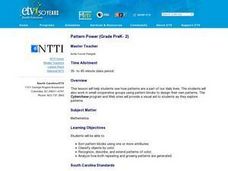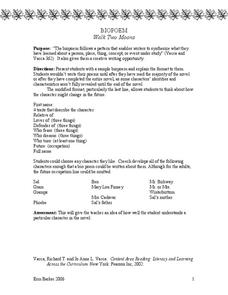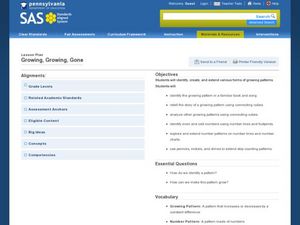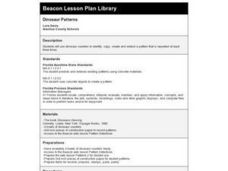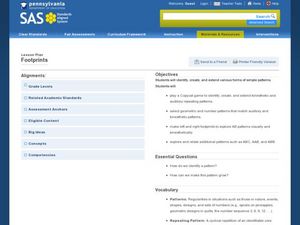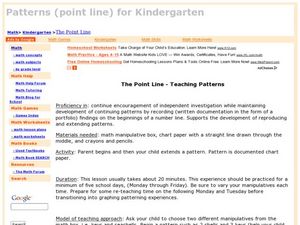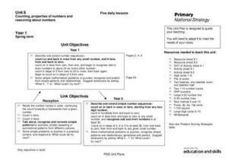Math in English
Number Patterns
Build the pattern recognition skills of young mathematicians with this simple skills practice learning exercise. Given nine different sequences of two-digit numbers, children must identify the pattern and determine the next three...
Curated OER
What's My Pattern?
Students recognize, describe and extend patterns in three activities. They organize data, find patterns and describe the rule for the pattern as well as use the graphing calculator to graph the data to make and test predictions. In the...
Curated OER
Representing Patterns & Evaluating Expressions
Write algebraic expressions, determine patterns, and evaluate expressions in a real-world context. Learners engage in a series of collaborative activities to identify, model, and give variables for real-world patterns. They write...
Curated OER
Pattern Power
Young elementary students will discover there are patterns all around them in their daily lives. In groups, they sort pattern blocks by size and color. Using the internet, they create their own type of patterns and share them with the...
Common Core Sheets
Determining Coordinates: Graphing Patterns
Building on their prior knowledge about patterns, this series of worksheets introduces young mathematicians to graphing in the coordinate plane. Using written descriptions of different numerical patterns, learners...
Oregon Department of Education
Building Number Sense
It's never too early to begin a child's math education. This collection of fun hands-on activities engage youngsters in building their number sense as they learn how to count objects, identify numerals, compare amounts, and much more.
PBS
Patterns to the Rescue!
Track down the Cyberchase episode that this lesson plan is associated with. Using a worksheet that is embedded in the plan, learners must find the next two numbers and shapes (a double pattern). Once these have been discovered, pupils...
Novelinks
Walk Two Moons: Biopoem
Middle schoolers describe the characters of Walk Two Moons as they write biopoems. Following the pattern provided, young writers depict their chosen characters' traits and experiences to make their poems unique.
Curated OER
Patterns Patterns Everywhere
Upper graders work with number patterns. In this pattern lesson, learners recognize and continue number patterns and find the rules. They do some as a class and complete an assessment.
State of Michigan
Pre-K Mathematics
Kick-start children's education with this pre-school math unit. Offering 31 different hands-on learning activities that develop young mathematicians' pattern and shape recognition, basic number sense, and much more, this is a...
Pennsylvania Department of Education
Extending Pattern Understandings
Students use shapes and manipulatives to demonstrate patterns. In this patterns lesson plan, students also break up patterns to identify a pattern unit.
Curated OER
Patterns Here, There, and Everywhere!
Upper graders access the Microsoft Word program and create patterns by utilizing certain keys on the keyboard. They create picket fences, smiley faces, and hearts. It seems that this lesson has as much to do with keyboarding skills as it...
Curated OER
Growing, Growing, Gone
Budding mathematicians identify growing patterns in numbers and songs then create their own patterns. They look at number patterns and language patterns and then create their own using money and footprints.
Curated OER
Patterns
Second graders work with different types of patterns. In this pattern lesson plan, 2nd graders go to a pattern block webpage and use Unifix cubes to create their own patterns. They find patterns in the real world and draw their own...
PBS
Women's History: Parading Through History
Want to teach your pupils about debate, effective speech techniques, propaganda, and the women's movement? The first in a sequential series of three, scholars analyze real propaganda images from the the historic women's movement, view a...
Curated OER
Dinosaur Patterns
Students listen to story Dinosaurs Dancing, use dinosaur counters to identify, copy, create and extend pattern that is repeated at least three times, and complete web lesson.
Curated OER
Repeating Patterns
Students explore growth patterns by using manipulatives such as pattern blocks, investigate growth pattern of pattern, record growth in T-chart, describe how pattern is growing, and predict number of blocks needed to extend pattern.
Houghton Mifflin Harcourt
Unit 3 Math Vocabulary Cards (Grade 1)
Reinforce math vocabulary with a set of flashcards. Each card showcases a boldly typed word or a picture representation with labels. The topics are geometry related and include terms such as cones, faces, pyramids, sides, and...
Curated OER
Visual and Number Patterns
Fourth graders develop strategies for identifying geometric and number patterns. In this mathematical patterns lesson, 4th graders use pattern blocks to make repeating patterns with numbers and shapes. Students then explore number...
Curated OER
Patterns That Grow
Students investigate growing patterns. In this additive patterns activity, students analyze the core of growing patterns. Students extend additive patterns based on the core.
Curated OER
Footprints
Students explore patterns. In this patterns geometry lesson, students identify and extend patterns including body parts, movement, geometric shapes, noises, and footprints. Students create and share an original pattern.
Curated OER
The Point Line - Teaching Patterns
Students practice extending patterns. In this patterns lesson plan, students demonstrate extending patterns by performing a rhythmic patter.
Curated OER
Counting, Properties of Numbers, and Reasoning about Numbers
Five days of lessons develop number sense and counting patterns, including odd and even numbers, 5s and 10s, doubles, and ways to make 10. Each session opens with fun finger play to reinforce counting and reasoning about numbers. Various...
National History Day
“Saving the Bear”: The Russian Expeditionary Force of World War One
How have Russian politics affected countries on a global stage? The discussion of the Russian Revolution and World War I begins with an analysis of primary resource letters. Learners finish with a project where they create a timeline of...



